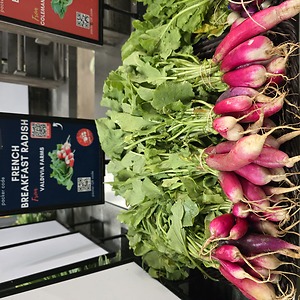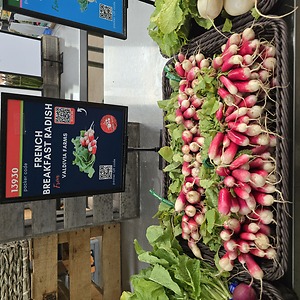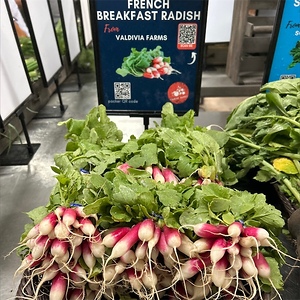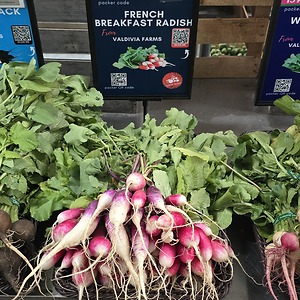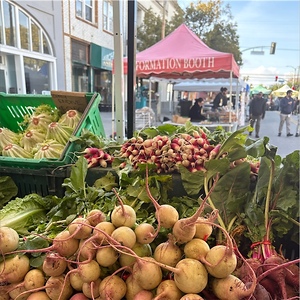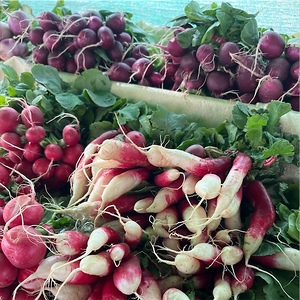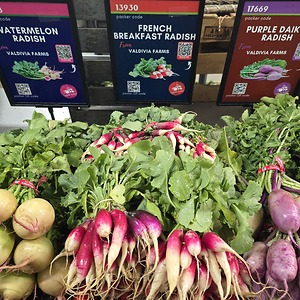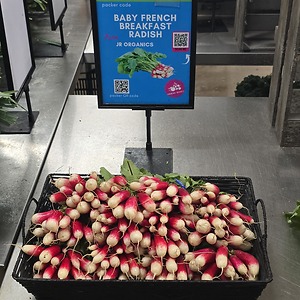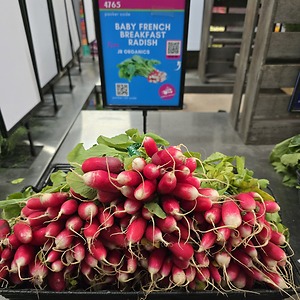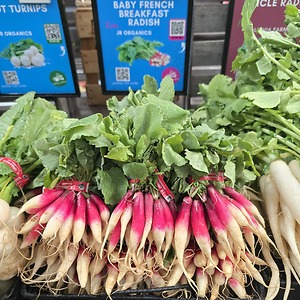


French Breakfast Radish
Estimated Inventory, 24 ct : 5.38
This item was last sold on : 08/02/25
Description/Taste
French Breakfast radishes are a small to medium-sized varietal, averaging 5 to 10 centimeters in length, and have an elongated, oblong to cylindrical appearance with a single taproot. The radish’s skin is thin, taut, and smooth, showcasing a two-toned nature of fuchsia-red hues with white tips. Underneath the surface, the flesh is white, dense, succulent, and crisp with a crunchy, snap-like consistency. French Breakfast radishes have a mild, earthy, and peppery flavor. When the roots are cooked, they develop a subtly sweet, nutty, and mellow taste. In addition to the roots, the leafy green tops are edible and have a crisp texture with a vegetal, green, and slightly peppery flavor.
Seasons/Availability
French Breakfast radishes are available year-round.
Current Facts
French Breakfast radishes, botanically classified as Raphanus sativus, are an heirloom variety belonging to the Brassicaceae family. The tender roots are fast-growing, typically maturing in 20 to 30 days, and can be sown year-round, with the mildest and sweetest roots produced in the cooler spring and fall seasons. French Breakfast radishes are also known as Breakfast radishes, Flambeau, Flambo, Les Radis Petit Déjeuner, and Radis Demi-Long Rose a Bout Blanc. The radishes were first recorded in 1879, and despite their French moniker, the radishes were not consumed in France as a breakfast item. French Breakfast radishes earned this label at the height of their popularity in Victorian England, as they were commonly consumed for breakfast among the English upper class and were named French for the root’s designation of origin. In the modern-day, the term Breakfast radish and French Breakfast radish has become a general descriptor for several varieties of elongated pink and white radishes. French Breakfast radishes are versatile roots that contribute mild, sweet, and peppery flavors in fresh and cooked savory preparations.
Nutritional Value
French Breakfast radishes are a source of fiber to regulate the digestive tract, potassium to balance fluid levels within the body, and vitamin C to strengthen the immune system while reducing inflammation. The radishes also provide calcium to build strong bones and teeth, magnesium to support nerve functioning, and folate to develop healthy red blood cells. Beyond vitamins and minerals, the radishes contain glucosinolates, compounds that give the roots their distinctly peppery flavor.
Applications
French Breakfast radishes have a mild, subtly sweet, and peppery flavor well suited for fresh and cooked preparations. The elongated roots can be consumed straight out of hand and have a pleasing shape for displaying on vegetable platters and dipping in sauces. The radishes can also be chopped and tossed into salads, diced as a fresh topping over tacos, or halved and added to tea sandwiches. French Breakfast radishes are most popularly scored with an X and dipped in butter as a snack in France. The radishes are also sprinkled with salt or placed on top of salted buttered toast, known as radis beurre et pain grille. French Breakfast radishes complement flavors found in butter, salt, and sweet cream and the peppery nature of the root helps to cut through the spread’s richness. In addition to raw preparations, French Breakfast radishes can be cooked to enhance the root’s sweet and mellow flavor. The radishes can be incorporated into stir-fries, chopped into omelets, roasted as a stand-alone side dish, or braised and served with savory meat dishes. They can also be thinly sliced and added to casseroles, incorporated into soups, or pickled as a tangy condiment. Beyond the radishes, French Breakfast radish greens are edible and can be tossed into salads, sauteed as a cooked green, stirred into soups, or mixed into egg-based dishes, rice recipes, and vegetables. French Breakfast radishes pair well with cheeses such as blue, goat, and feta, lemon juice, fresh herbs including thyme, rosemary, cilantro, and oregano, and meats such as beef, pork, and poultry. Whole, unwashed French Breakfast radishes will keep up to one week when stored in the refrigerator.
Ethnic/Cultural Info
French Breakfast radishes are simply known as Breakfast radishes in England and were once consumed during the Levens Radish Festival in Cumbria, Northern England. Levens Hall is a private manor in the Kent Valley that hosted the annual radish feast on May 12th, believed to have been established in 1822. The festival was founded to create goodwill between the Lord of the Manor at Levens Hall, and the public who worked at a market under the Lord’s stewardship, and the celebration was traditionally held after the collection of rents and dues. During the radish festival, long tables were placed in the garden and were covered with butter, radishes, bread, and morocco, a type of strong beer. The all-male event featured many drinking games, sports, songs, and races, and throughout the activities, radishes would be dipped in the butter and eaten with bread as a snack. Radishes for the festival were reported to have been grown on flannel strips over hotbeds, and there were so many radishes cultivated that it took at least four men to harvest and prepare the roots for the festival. The Levens Radish Festival was annually held until the 1880s, and at one point, the festival became so popular that there were over 500 attendees.
Geography/History
French Breakfast radishes are an heirloom variety first recorded in Europe in 1879. The mild, peppery, and subtly sweet roots were a popular radish in Parisian markets, and later they became a breakfast item during the Victorian Era, spanning 1837 to 1901, served with toast, cress, and potted shrimp. French Breakfast radishes were eventually introduced to the United States in the 1870s, sold as a specialty root, and by the 1880s, the radishes were listed in American seed catalogs. Today French Breakfast radishes thrive in mild climates and are commercially cultivated on a small scale, sold direct to consumers, offered through specialty retailers, or found at select grocers. The radishes can also be planted in home gardens and are favored as a culinary variety.
Featured Restaurants
Restaurants currently purchasing this product as an ingredient for their menu.
| Mission Pacific | Oceanside CA | 760-450-7864 |
| Toast Catering | San Diego CA | 619-795-9135 |
| 31ThirtyOne by Deckman | San Diego CA | 619-495-9814 |
| Black Radish | San Diego CA | 619-775-7412 |
| Pendry SD (Pool House) | San Diego CA | 619-738-7000 |
| LANA | Solana Beach CA | 602-758-2596 |
| MCRD-Marine Corps Recruit Dept | San Diego CA | 619-725-6478 |
| The Kitchen at MCASD | La Jolla CA | 619-880-8719 |
| Hotel La Jolla - Sea & Sky | La Jolla CA | 858-459-0261 |
| Tom Hams Light House | San Diego CA | 619-291-9110 |
| The Lion Share | San Diego CA | 619-564-6924 |
| Sheraton Carlsbad (20/20) | Carlsbad CA | 760-827-2400 |
| Seneca | San Diego CA | 619-588-2411 |
| Huntress | San Diego CA | 619-955-5750 |
| Urban Kitchen Catering | San Diego CA | 619-276-8803 |
| Saint Mark Golf and Resort, LLC | San Marcos CA | 508-320-6644 |
| Candor | La Jolla CA | 858-581-2205 |
| Bar Ella | San Diego CA | 858-808-2286 |
| Maderas Golf Club | Poway CA | 858-451-8100 |
| Top of the Market | San Diego CA | 619-234-4867 |
| Lafayette Hotel - Beginners Diner | San Diego CA | 619-296-2101 |
| Convention Center Shell | San Diego CA | 619-954-3063 |
| The Beau Hotel | San Diego CA | 619-310-5160 |
| Salt & Whiskey | San Diego CA | 619-544-1886 |
| Stake Chophouse & Bar | Coronado CA | 619-522-0077 |
| Sbicca Del Mar | Del Mar CA | 619-417-2587 |
| Le Coq | La Jolla CA | 858-427-1500 |
| Elks Lodge 2698 -Donation | Lakeside CA | 619-390-4949 |
| The Lion Share 2025 | San Diego CA | 619-564-6924 |
| 264 Fresco (Kitchen) | Carlsbad CA | 760-720-3737 |
| Carte Hotel | San Diego CA | 619-365-1858 |
| Jeune Et Jolie | Carlsbad CA | 858-231-0862 |
| Kona Kai Resort and Marina | San Diego CA | 619-221-8000 |
| Paradise Point Resort Tidal | San Diego CA | 858-490-6363 |
| The Besta-Wan Pizza House | Cardiff CA | 805-231-2515 |
| Zoya | La Jolla CA | 619-942-3396 |
| Sandpiper Wood Fired Grill & Oysters | La Jolla CA | 858-228-5655 |
| La Jolla Beach & Tennis Club | San Diego CA | 619-816-8319 |
| Wormwood | San Diego CA | 619-573-0289 |
| Boujiemana | San Diego CA | 415-710-0510 |
| Boujiemana (La Maison) | San Diego CA | 415-710-0510 |
| Merenda | Oceanside CA | 703-459-4145 |
| Mia's | Carlsbad CA | 909-521-8239 |
| Lumi | San Diego CA | 619-955-5750 |
| Cal A Vie | Vista CA | 760-945-2055 |
| Rustic Root | San Diego CA | 619-232-1747 |
| Kingfisher | San Diego CA | 619-861-8074 |
| Kettner Exchange | San Diego CA | 909-915-9877 |
Recipe Ideas
Recipes that include French Breakfast Radish. One



